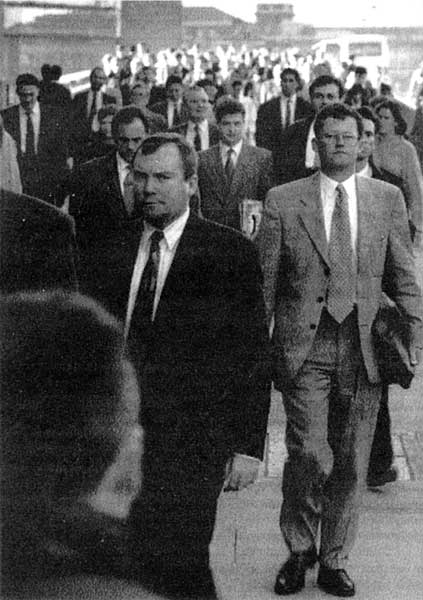
It’s The Jewel In The Mud Award
This issue’s Gem from the muddled media waters comes from Jay Griffiths and an article entitled “Life of strife in the fast lane” appearing in the Guardian second section August 23
Squall 11, Autumn 1995, pg. 83.
Take the cow: it can be hard to understand the deification of the cow in Indian villages. But pause. In westernised Delhi or Bombay, amid the fizzing pandemonium of the fast lane, watch the awesome cow in awesome slowness chew. Then you know.
Speed is something of a holy cow to modern westernised cultures. On the international foreign exchange markets, up to £200 million can be turned over in a little more than a minute. News media can communicate events all but instantaneously. Computers can perform 307 gigaflops per second. Transport policies sacrifice any number of Sites of Special Scientific Interest to it, and Brands Hatch is a temple to it...
In a socially competitive…. world, speed is an index to status. The poor travel more slowly; their time is considered less valuable. They are overtaken by the rich and powerful, who are not to be kept waiting; for them the fastest cars, high speed trains and plane shuttles. Oh what transports of elites.
Besides competition, Mark Marchant (professional racing driver at Brands Hatch) articulates another attraction of speed: control. “Being on the ragged edge of the limit of control is exciting. You’re not far away from the ultimate of not being in control.”….
The foreign exchange market is a speed-conscious place, and talking to one dealer at HSBC Midland in London is like meeting Lewis Carroll’s White Rabbit. Hyperalert, fast of speech, eyes darting andbreath jerky, he is high on speed, but he takes no drugs; the job is drug enough…. He says he is “addicted to adrenalin”, works “in hypermode”, and admits “if you don’t enjoy the rushes, you can’t do the job”. He is a man in love with speed. He describes his faults as speed-related: being easily frustrated by people, short-tempered and intolerant. His personal calls last, on average, five seconds. Are his friends intimidated by the speed he’s going at? “Maybe, yes, but half the time I don’t notice. I’m going too fast.”
Personal relationships need to develop over time, with time, and speed destroys them, even while it provides a substitute. Speed itself is the hallucinatory friend. Speed stimulates, speed stops you feeling bored or lonely. If you can do a ton up on the motorway while eating chocolate, who needs sex?....
Speed adversely affects language; at speed you can afford no margins of irony, no space for play. Fast language is a faddy fashion victim, buying buzz words, flavours of the month, overused, worn out and discarded. Verbal speeding short-changes language…. For the sake of efficient, streamlined transmission, you lose
intuited, allusive nuances. Speed insists on the cliche, the verbal path well beaten, the motorway. Language wants to take the scenic route, but freedom to roam is made a trespassory offence and language is taken prisoner by speed, let out only occasionally on parole.
Skim-talking and skim-reading promote skim-thinking. Thoughts summoned at speed are likely to be not the best thoughts but simply the first, the habitual response, thoughts automatic as opposed to thoughts idiomatic, reflective or ruminative….
Fast travel is a kind of visual consumerism, offering constant replacement of one view with ensuing, newly identical, views. Travel replicates the model of consumer desires; once first wishes are met, desires must augmented. As John Whitelegg (director of Eco-Logical Ltd, an environmental and transport consultancy) says: “People consume the benefit of speed by spending it on distance.” Transport studies show that time saved in one journey is used to make additional journeys not previously considered, mainly in cars. But as Whitelegg points out: “The congestion costs which motorists impose on others are not bourne by car drivers.”….
Car drivers get their benefits - speed and comfort - paid for by other road-users in the coin of fear, injury, pollution and congestion. Emotionally, fast drivers get the excitement of speed while their passengers feel the drawbacks; anxiety and powerlessness. There is an analogy with westernised economic structures, where those in the financial driving seat get the rewards of the system, while the dispossessed, without access to the controls, suffer the pain of job insecurity and poverty.
Signs are that many passengers are suffering speeding sickness, and these dizzy dissidents of speed are calling for the vehicle of society to slow down, most wisely and wittily in the road protest movement. Environmentalists see our pace far outstripping nature’s speed - we pollute far faster than nature can clean, and we plunder more than it can renew….
Our children’s survival…. depends on our judicious, and speedy, use of the brakes. The trouble is that the car is being driven by a 17-year-old, hooked on speed, seeing the world’s resources as something to be used up before anyone else gets to them….
(Modern, western society) is a culture ignorant of the past and viciously refusing to plan for the future, respecting not the old, cherishing not the young. Its exports are adolescent: fast cars, fast food, fast talk, fast bucks. Fast in everything, puerile and premature, modern westernised culture could never have produced the Karma Sutra, would never pause to consider the point of orgasm maintained for hours. In contrast to the duration of love, and the love of duration, the West’s great love-affair is with obsolescence. Jejune in its desire for speed above subtlety, it crashes up through the gears, cornering too fast, flinging grit in the eyes of the ancient cow, in ancient slowness chewing. In rumination still.
Related Articles
The Jewel In The Mud Award - Battle of the Beanfield in the media ten years on, report by Neil Goodwin. Squall 10 - Summer 1995.
